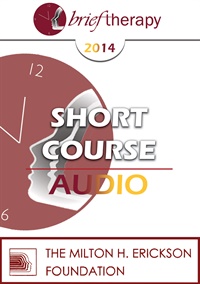
- Average Rating:
- Not yet rated
- Topic Areas:
- Short Courses | Borderline | Brief Therapy | Personality Disorders
- Categories:
- Brief Therapy Conference | Brief Therapy Conference 2014
- Faculty:
- Michael Munion, MA, LPC
- Duration:
- 1:30:14
- Format:
- Audio Only
- Original Program Date:
- Dec 11, 2014
- Short Description:
- This course examines the nature of Borderline Personality Disorder (BPD), and presents an integrated model for treatment of specific issues in brief, solution-focused episodes. Core elements of a safety plan and development of a community resource network are described. Careful management of the therapeutic relationship is a critical part of this approach. Some specific protocols for common BPD issues, such as suicidal ideation and self-injurious behaviors are elaborated.
- Price:
- $15.00 - Base Price
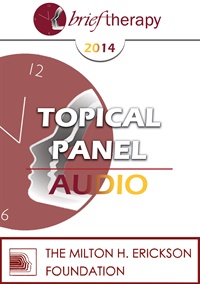
- Average Rating:
- Not yet rated
- Topic Areas:
- Post-Traumatic Stress Disorder (PTSD) | Trauma | Topical Panels | Brief Therapy
- Categories:
- Brief Therapy Conference | Brief Therapy Conference 2014
- Faculty:
- Francine Shapiro, PhD | Bill O'Hanlon, MS | Bessel van der Kolk, MD
- Duration:
- 1:02:30
- Format:
- Audio Only
- Original Program Date:
- Dec 13, 2014
- Short Description:
- BT14 Topical Panel 02 - Post Traumatic Disorders - Francine Shapiro, PhD, Bill O’Hanlon, MS, and Bessel van der Kolk, MD Educational Objectives: Compare and contrast clinical philosophical perspectives of experts.
- Price:
- $15.00 - Base Price
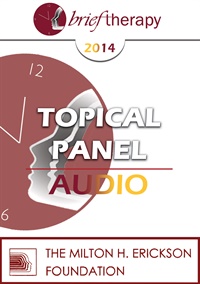
- Average Rating:
- Not yet rated
- Topic Areas:
- Topical Panels | Brief Therapy | Goals of the Therapist
- Categories:
- Brief Therapy Conference | Brief Therapy Conference 2014
- Faculty:
- Jeffrey Zeig, PhD | Pat Love, EdD | Stephen Gilligan, PhD
- Duration:
- 1:01:29
- Format:
- Audio Only
- Original Program Date:
- Dec 13, 2014
- Short Description:
- BT14 Topical Panel 05 - The Goal of Therapy - Pat Love EdD, Stephen Gilligan, PhD, and Jeffrey Zeig. PhD Educational Objectives: Compare and contrast clinical philosophical perspectives of experts.
- Price:
- $15.00 - Base Price
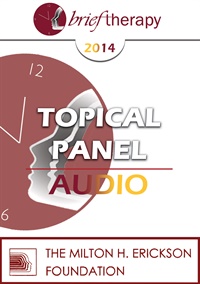
- Average Rating:
- Not yet rated
- Topic Areas:
- Anxiety | Topical Panels | Brief Therapy
- Categories:
- Brief Therapy Conference | Brief Therapy Conference 2014
- Faculty:
- Lynn Lyons, LICSW | Reid Wilson, PhD | Ronald Siegel, PsyD
- Duration:
- 1:01:07
- Format:
- Audio Only
- Original Program Date:
- Dec 13, 2014
- Short Description:
- BT14 Topical Panel 06 - Anxiety Disorders - Reid Wilson, PhD, Lynn Lyons, LICSW, and Ronald Siegel, PsyD Educational Objectives: Compare and contrast clinical philosophical perspectives of experts.
- Price:
- $15.00 - Base Price
Tags: Anxiety Brief Therapy
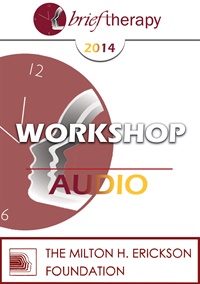
- Average Rating:
- Not yet rated
- Topic Areas:
- Couples Therapy | Workshops | Brief Therapy | Emotionally Focused Therapy (EFT)
- Categories:
- Brief Therapy Conference | Brief Therapy Conference 2014
- Faculty:
- Sue Johnson, EdD
- Duration:
- 1:39:09
- Format:
- Audio Only
- Original Program Date:
- Dec 12, 2014
- Short Description:
- This workshop will outline three key change events in EFT: Negative cycle de-escalation, hold me tight bonding conversations and Attachment injury Forgiveness. Each even will be outline, examples given and specific interventions outline and practiced. Throughout the workshop theory, research and practice will be integrated.
- Price:
- $15.00 - Base Price
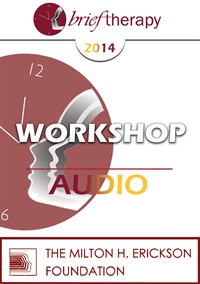
- Average Rating:
- Not yet rated
- Topic Areas:
- Anxiety | Workshops | Unconscious Processes | Brief Therapy
- Categories:
- Brief Therapy Conference | Brief Therapy Conference 2014
- Faculty:
- Steve Andreas, MA, NLP
- Duration:
- 1:05:06
- Format:
- Audio Only
- Original Program Date:
- Dec 12, 2014
- Short Description:
- Learn two very simple, rapid, and direct ways to elicit and transform the key unconscious processes that create anxiety. One utilizes changes in the sensory details of the feeling itself; the other changes the tempo of the internal worry voice that generates the feeling. Demonstrations, exercises and discussion.
- Price:
- $15.00 - Base Price
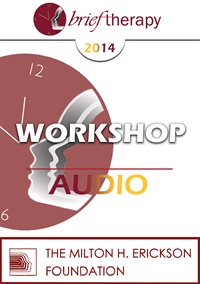
BT14 Workshop 03 - Anxious Kids, Anxious Parents: 7 Ways to Stop the Worry Cycle - Lynn Lyons, LICSW
- Average Rating:
- Not yet rated
- Topic Areas:
- Anxiety | Worry | Workshops | Brief Therapy | Children and Adolescent Therapy
- Categories:
- Brief Therapy Conference | Brief Therapy Conference 2014
- Faculty:
- Lynn Lyons, LICSW
- Duration:
- 1:50:51
- Format:
- Audio Only
- Original Program Date:
- Dec 12, 2014
- Short Description:
- Current research supports the inclusion of both parents and children in the treatment of anxiety in children based on the strong correlation between anxious parents and the subsequent development of anxiety in their children. This workshop will describe seven concrete strategies that teach families to interrupt the worry cycle and its all too common transmission from parent to child.
- Price:
- $15.00 - Base Price
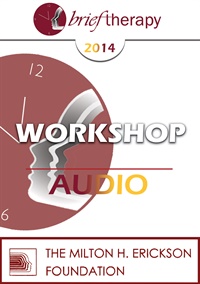
- Average Rating:
- Not yet rated
- Topic Areas:
- Psychotherapy | Workshops | Generative Psychotherapy | Leadership | Therapist Development | Brief Therapy
- Categories:
- Brief Therapy Conference | Brief Therapy Conference 2014
- Faculty:
- Stephen Gilligan, PhD
- Duration:
- 2:02:36
- Format:
- Audio Only
- Original Program Date:
- Dec 12, 2014
- Short Description:
- His workshop will explore how generative psychotherapy can help clients activate the creative consciousness needed to live their lives in positive, fulfilling ways. This process requires the cultivation of self-leadership (and self-COACH) skills, such that a person’s performance self and observer self-work in a mutually respectful, harmonious pattern. The workshop presents some core methods of this approach, including somatic modeling, self-scaling, and engaging the creative unconscious. A demonstration and multiple case examples will illustrate how such methods can allow psychotherapy to be a deeply positive, effective conversation.
- Price:
- $15.00 - Base Price
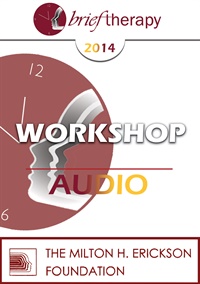
- Average Rating:
- Not yet rated
- Topic Areas:
- Trauma | Workshops | Attachment | Brief Therapy
- Categories:
- Brief Therapy Conference | Brief Therapy Conference 2014
- Faculty:
- Bessel van der Kolk, MD
- Duration:
- 1:58:50
- Format:
- Audio Only
- Original Program Date:
- Dec 12, 2014
- Short Description:
- Traumatic experiences and disorganized attachment affect people differently at different stages of mind and brain development.
- Price:
- $15.00 - Base Price
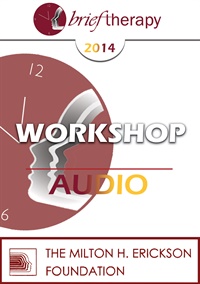
- Average Rating:
- Not yet rated
- Topic Areas:
- Eye Movement Desensitization and Reprocessing (EMDR) | Workshops | Brief Therapy | Trauma
- Categories:
- Brief Therapy Conference | Brief Therapy Conference 2014
- Faculty:
- Francine Shapiro, PhD
- Duration:
- 1:39:56
- Format:
- Audio Only
- Original Program Date:
- Dec 12, 2014
- Short Description:
- This presentation will provide therapeutic guidelines to help identify the source of a wide range of clinical problems, and demonstrate how they can be addressed. EMDR therapy is widely recognized as an effective trauma treatment by organizations such as the American Psychiatric Association and the World Health Organization. In addition, 20 randomized studies demonstrate positive effects of the eye movement component. Research has also clearly demonstrated that certain kinds of life experiences lay the foundation for both mental and physical problems. Clinical and neurobiological research demonstrates that EMDR therapy directly addresses the physiological basis of clinical symptoms and dysfunction.
- Price:
- $15.00 - Base Price
Please wait ...

